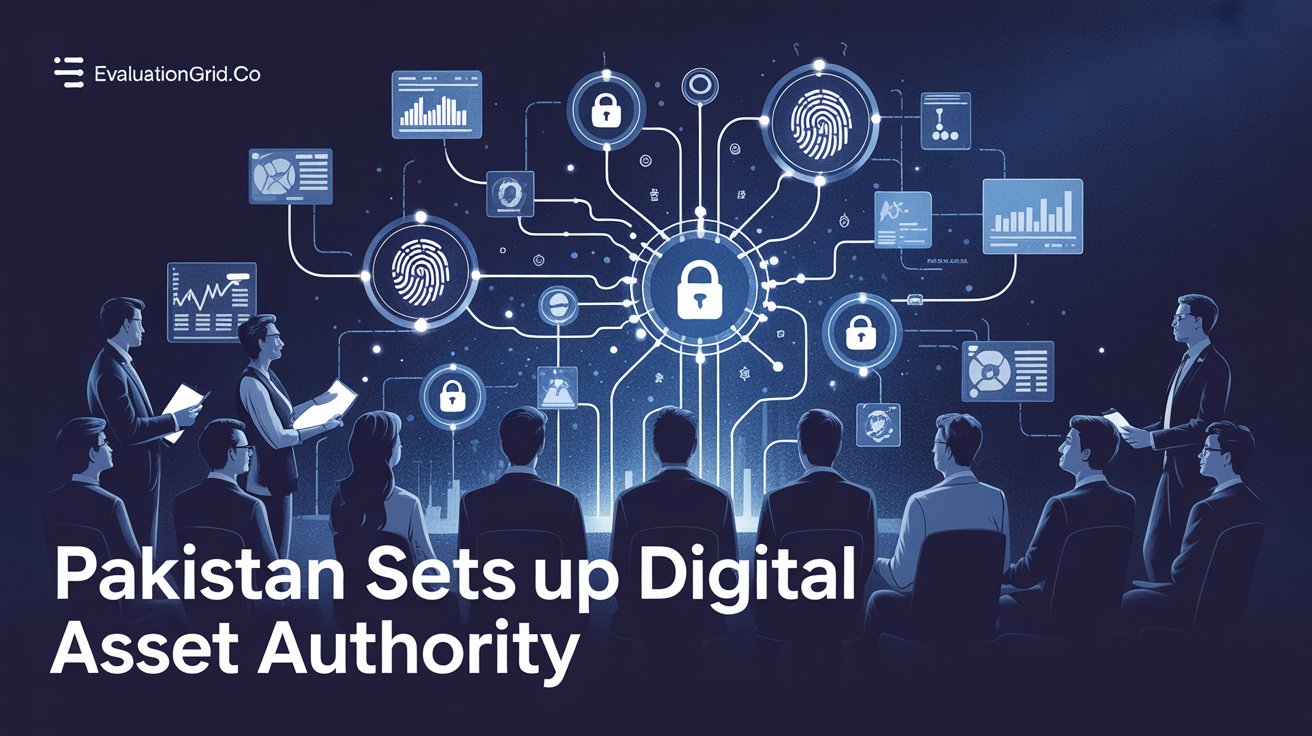Launching the Pakistan Digital Assets Authority (PDAA) is a major step towards digital money for the Pakistani government. The growing field of digital financial technologies, including cryptocurrencies, blockchain projects, and others, has given rise to a new regulatory authority. While following the standards set by the Financial Action Task Force (FATF) is certainly a catalyst, getting Pakistan’s economy ready for the digital age is another important goal.
If your business falls under the Digital Assets Authority, Evaluation Grid can help you handle compliance without the usual guesswork.
This blog explains everything in detail in case you are interested about what this means for investors, cryptocurrency users, or the economy in general.
Why the PDAA is Required
The cryptocurrency industry in Pakistan has been in legal instability for quite some time. Without established norms or standards, individuals have been engaging in digital asset trading, investing, and development. This uncontrollable industry is huge, with experts estimating its size to be close to $25 billion.
Problems like customer fraud, money laundering, and terrorism funding grow in the absence of transparent legislation. Pakistan has long been encouraged by FATF, an international organization that regulates global financial systems, to establish regulations in this area. To satisfy global standards and take control of this growing sector and make sure it’s safe, secure, and useful for everyone, Pakistan has PDAA.
What is the PDAA, and What Will It Do?
The Pakistan Digital Assets Authority is not just a symbolic organization; it has been entrusted with major duties to govern and supervise the complete system of digital assets. You can see it like this:
1. Licensing Digital Asset Services
Cryptocurrency exchanges, digital wallet providers, custodial services, and other related businesses will now be required to register and obtain a license. This promotes openness and responsibility.
2. Regulating Platforms & Coins
The purpose of the Pakistan Digital Assets Authority is to provide transparent regulations for the responsible use of decentralized financial applications, stablecoins, and tokenized assets.
3. Supporting Innovation
The goal of the PDAA is not only regulation; it is to provide a safe space for developers, entrepreneurs, and innovators to test out blockchain and crypto ideas.
4. Tokenization of Government Assets
Tokenizing national assets is an interesting idea; this would include converting government-owned assets or debts into tradeable digital tokens, allowing for more efficient fund-raising.
5. Bitcoin Mining Regulation
The Pakistan Digital Assets Authority (PDAA) will publish regulations for controlled Bitcoin mining in Pakistan so as to manage and profit from mining’s power consumption.
How Does This Compare to Other Countries?
Regulating digital assets and cryptocurrencies is nothing new, and Pakistan isn’t solo in this. Many countries have already begun to establish regulations that will secure investors and promote innovation in this growing sector.
The UAE has established specialized free zones, such as the Crypto Centre inside the Dubai Multi Commodities Centre (DMCC), to position itself as a regional crypto hub. Global crypto enterprises and startups are being drawn to these zones due to their clear legislation, tax incentives, and quick business creation processes. Because of its forward-thinking policies, the United Arab Emirates is now widely considered a favorable setting for blockchain technology.
Many people consider Singapore to be one of the countries that is most welcoming to cryptocurrency. Under the Payment Services Act, the Monetary Authority of Singapore (MAS) establishes clear licensing regimes, which promotes the growth of fintech while guaranteeing strong investor protection. Crypto exchanges, token sales, and blockchain initiatives are flocking to Singapore because of its open and efficient rules.
Not only that, but Hong Kong and Japan have also made great gains. Japan took crypto regulation seriously early on, establishing strict rules for exchanges to protect customers and prevent fraud. Positioning itself as a competitive financial hub, Hong Kong has lately revised the regulatory structure to make digital asset trading easier with clear norms.
Pakistan believes to become a leading South Asian hub for blockchain and cryptocurrency innovation by forming the Pakistan Digital Assets Authority (PDAA) to create a regulatory framework that helps investors, promotes creativity, and develops local talent.
What Does This Mean for the Economy?
A well-managed situation could have far-reaching, usually beneficial consequences:
Bringing the Crypto Market into the Formal Economy
Pakistan has a huge unofficial cryptocurrency market that may be formalized and regulated with the right licenses, tax laws, and open reporting. There will be fewer risks in uncontrolled trade and more money coming to the government as a result of this.
Boost in Global Investments
Investor trust is strengthened by transparent crypto regulations. When Pakistan’s legal environment is clear and safe, international investors and VCs would be more likely to back blockchain initiatives and businesses based in the country.
Empowering Youth and Startups
A more secure environment will be developed for young entrepreneurs and engineers to experiment with blockchain technology. New applications, financial platforms, and cryptocurrency services can be developed with this backing, which in turn can stimulate economic expansion.
Better Financial Access
Digital wallets and crypto-based financial services can help millions of Pakistanis who do not have bank accounts. More people, particularly in underserved and rural areas, will be able to save, invest, and send money home with the support of these instruments.
Statements from Major Stakeholders
Finance Minister and Pakistan Cryptocurrency Council (PCC) Chairman Muhammad Aurangzeb stated:
“Pakistan must regulate not just to catch up — but to lead. With the PDAA, we are creating a future-ready framework that protects consumers, invites global investment, and puts Pakistan at the forefront of financial innovation.” Business Recorder
Bilal Bin Saqib, CEO of the Pakistan Crypto Council, highlighted:
“This is not just about crypto — it’s about rewriting our financial future, expanding access, and creating new export channels through tokenization, digital finance, and Web3 innovation.”
Challenges and Considerations
The Pakistan Digital Assets Authority establishment is commendable, however there are still multiple challenges that must be overcome:
Digital Infrastructure
Pakistan needs to quickly invest in modern financial technology systems, reliable data centers, and better internet access. For blockchain platforms and digital asset exchanges around the country to function smoothly, securely, and efficiently, these upgrades are necessary.
Skilled Workforce
Pakistan should invest in specialist training programs if it wants to build its digital asset sector and govern it effectively. Expertise in blockchain technology, compliance standards, and digital asset management best practices can be attained by regulators and industry experts with the help of these.
Public Education
It is important to launch public education efforts to educate the general public about digital assets and how they perform. People can engage with blockchain services and cryptocurrencies with confidence when they are educated about the risks of scams and disinformation and can make educated decisions based on that knowledge.
Cybersecurity
To prevent cybercrime, fraud, and data breaches, strong cybersecurity protocols are necessary for digital asset marketplaces. Users’ confidence in Pakistan’s new digital banking system can only grow with strict security measures.
How Evaluation Grid Can Helps with Pakistan’s New Digital Asset Authority
It is even more important than ever to manage digital assets securely in light of the clear regulations set out by PDAA. Businesses and individuals in Pakistan can benefit from Evaluation Grid’s professional advice on how to handle their cryptocurrency assets safely and in accordance with local rules.
To help blockchain firms expand, we analyze the market, assess risks, and offer support. If you want expert guidance and resources to tackle the digital asset field with confidence and enjoy its full potential, Evaluation Grid is the way to go.
What’s Next?
It is believed that the State Bank of Pakistan, the Ministry of IT, and the SECP will all work closely with the PDAA to provide a uniform legal and operational structure for digital financial services.
In the coming months, we’re likely to see:
- New rules for crypto exchanges
- Tokenization pilots for national assets
- Digital identity and wallet systems
- Startup-friendly blockchain innovation hubs
Need help understanding the Digital Asset Authority in Pakistan? Get clear, practical guidance to manage digital assets and stay compliant.
Final Thoughts
There is more at work than just FATF compliance in establishing the Pakistan Digital Assets Authority. This indicates the government’s willingness to support productive innovation and create an environment where safety, openness, and development are interdependent.
Although there is still a long way to go in terms of infrastructure, education, and cybersecurity, this step has the potential to bring in a new era of investment, innovation, and monetary policy in Pakistan.
As Pakistan begins on its future with PDAA, trust the Evaluation Grid to help you explore, invest, and succeed in the digital asset field.






